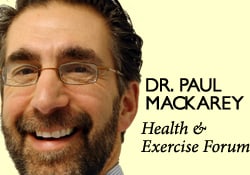
According to the North American Menopause Society (NAMS), 1.5 million American women reach menopause each year. The median age is 52, but some women will reach menopause as early as 40 or as late as 58. Recent research revealed that menopausal women who engaged in three hours of exercise per week for one full year reported improved mental and physical health.
Menopause begins when women’s ovaries are depleted of healthy eggs. Typically, women are born with 1-3 million eggs which are lost over the course of a women’s life through ovulation and other natural means. Under normal conditions, a reproductive hormone called follicle-stimulating hormone, (FSH) stimulates the growth of the eggs during the first half of the menstrual cycle. As a woman approaches menopause, the eggs become more resistant to FSH. Additionally, the ovaries produce significantly less estrogen, a hormone that affects the blood vessels, heart, bone, breasts, uterus, skin and brain. Many of the symptoms associated with menopause are due to the loss of estrogen. These symptoms include: hot flashes, irregular or skipped periods, insomnia, mood swings, fatigue, depression, irritability, racing heart, headaches, joint and muscle pain, decrease sex drive, vaginal dryness, and loss of bladder control. While not all women get these symptoms. Most women experience various degrees of some of these symptoms.
Several studies support the fact that women who engage in regular exercise report less menopausal symptoms than those who are inactive. One particular study in the Journal of Advanced Nursing, found that women who engaged in 3 hours of exercise per week for one full year reported improvement in mental and physical health as compared to the control group. The program consisted of cardiovascular, stretching, strengthening, and relaxation exercises.
In another study published in the Annals of Behavioral Medicine, researchers found that women who walked or performed yoga reported improvements in quality of life with less anxiety and stress related to their menopause symptoms. It is believed that exercise stimulates a release of endorphins in the brain and this is the primary mechanism by which exercise relieves symptoms associated with menopause.
Consult with your family physician before you begin an exercise program, especially if you have health issues. Consider a consultation with an orthopedic or sports physical therapist for professional advice to begin an exercise program best for you. Wear comfortable exercise clothing and sneakers. Exercise to control menopause symptoms does not have to be extreme. A simple increase in daily activity for 15 minutes 2 times per day or 30 minutes 1 time per day is adequate to control your symptoms. This can be simply accomplished by walking, swimming, biking, and playing golf or tennis. For those interested in a more traditional exercise regimen, perform aerobic exercise for 30-45 minutes 4-5 days per week with additional sports and activities for the remainder of the time. For those in poor physical condition, begin slowly. Start walking for 5-10 minutes, 2-3 times per day. Then, add 1-2 minutes each week until you attain a 30-45 minute goal. Keep in mind, weight bearing exercises such as: walking, hiking, and light weight training are important for improving the loss of bone density associated with menopause.
Visit your doctor regularly and listen to your body.
NEXT MONDAY – Read Dr. Paul J. Mackarey “Health & Exercise Forum!”
This article is not intended as a substitute for medical treatment. If you have questions related to your medical condition, please contact your family physician. For further inquires related to this topic email: drpmackarey@msn.com
Paul J. Mackarey PT, DHSc, OCS is a Doctor in Health Sciences specializing in orthopaedic and sports physical therapy. Dr. Mackarey is in private practice and is an associate professor of clinical medicine at GCSOM.